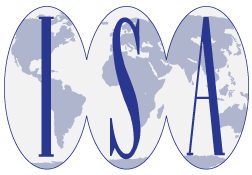

ISA 2021 Annual Convention: Globalization, Regionalism and Nationalism: Contending Forces in World Politics
Tue, 06 Apr 2021 - Fri, 09 Apr 2021
Online
Organized by: International Studies Association
Contact: sa@isanet.org
The global pandemic has changed many things about our personal and professional lives. At ISA, we have been working diligently since the cancellation of #ISA2020 in Honolulu to understand how these changes impact what we do professionally and in service to our members. ISA Headquarters’ staff have been researching the feasibility of a wide array of options for #ISA2021, ranging from an in-person to hybrid to an entirely virtual event.
While we all hoped to be able to meet in person, the health and safety of the ISA community is our top priority. We have determined that the ISA 2021 Convention will move to an entirely virtual platform. Given the ambiguity of global vaccination distribution, on-going travel restrictions, budget cuts and the potential on-site spacing constraints for in-person events, we saw little room for a different choice.
The conference dates will be April 6-9, 2021, and the days will be extended from 8am - 10pm EDT (New York time) to facilitate participation across our global membership. We expect to announce the preliminary program in early November. Beyond panels and roundtables, we will offer opportunities for networking and social interaction throughout the week. We will be announcing more details in the near future.
Over the last two decades, the volume and intensity of attacks on globalization have been steadily rising. The backlash has not been confined to rich countries; developing countries such as India, Philippines, Brazil, Malaysia, and others are also witnessing popular challenges to the liberal international order. Since the mid-1940s, the architects of the Bretton Wood system set the stage for a liberal international order that has governed political and economic relations between capitalist and democratic nations. Although this is not the first time the liberal international order has been challenged, it is now being resisted through democratic elections and expressed through populist, nationalist, protectionist and anti-globalization movements. International organizations that were given the mandate to institutionalize rules of the liberal order are increasingly under threat and viewed to be interfering the domestic authority of states. In various ways and in many countries throughout the world, individuals, political parties, and grassroots movements are challenging different aspects of ‘liberal’, ‘international’, and ‘order’.
Our 2021 conference theme seeks to understand the actors, anxieties, and political forces in international and domestic politics that are shaping- and shaped by- the changing world. Scholars in the international studies profession- who analyze the interactions between power, voice, and rules at the local and international level- are well poised to provide insights into these trends. At the same time, these current challenges require a fresh approach to our study of international politics, focused on engagement and communication across ideological, disciplinary, regional and methodological lines to more fully understand recent unanticipated (and anticipated) global events. We invite proposals that tackle these issues from a variety of perspectives and at a variety of levels of analysis. We are particularly interested in work that helps us 1) understand changes at the global level influence regional, national, and local politics, or 2) the reverse: how local, national or regional political interactions might be changing the global order.
Some representative questions the theme might address include:
- What are the forces challenging the liberal international order (LIO)? Are these similar across regions? Countries? international institutions?
- What interests are and are not represented in anti-globalization movements?
- How have the current structures of power and rules in the LIO influenced the rise of countervailing forces today?
- How can we explain the role of emerging powers and/or the Global South in the politics influencing support and resistance to the current liberal international order?
- How and under what conditions does local dissatisfaction with LIO impact power structures change?
- What is the perspective of the Global South and how are they reacting to these trends?
- What is the future of US political and economic relations with other rising powers, and China in particular?
- What are the challenges brought by accelerating trade, supply chains, capital and technology flows? How and under what conditions do they impact international relations, domestic politics and society?
- How is the current LIO impacting nationalist fever and ethnic conflict?
- How do we envision the legitimacy and functioning of international organizations in the changing global economy?
- How do we understand the role of national and local democratic institutions in the face of changing global order? Under what conditions is current angst about globalization placing democratic institutions under threat?
- What is the role of public opinion in shaping governance issues related to globalization?
- What are the most successful strategies for economic and political development in this new era?
- How are local, national, and international level governments dealing with global crises such as climate change, and immigration?











